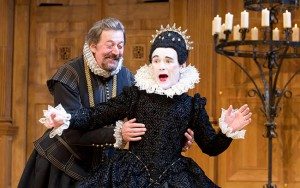

Yesterday (Nov. 10), two-time Tony winner Mark Rylance returned to Broadway in a Shakespeare double bill: “Twelfth Night” and “Richard III”. Both shows began previews Oct. 15, and both are being done old-old-school style: all-male casts, the actors dressing and doing their makeup onstage in front of the audience, lighting by actual candles, and traditional instruments playing the accompanying music (scored by Rylance’s real-life wife, Claire van Kampen). In the comedy, Rylance cross-cross-dresses to play the heiress Olivia, while Stephen Fry, of “Bones”, “Blackadder” and “Fry and Laurie” fame, plays her pompous steward, Malvolio.
In the historical tragedy “Richard III”, Rylance plays the ultra-ambitious title character. Both shows co-star “The History Boys” Tony nominee Samuel Barnett (Fry appears only in “Twelfth Night”).
It’s a big season for Shakespeare on Broadway, what with Ethan Hawke soon to arrive in “Macbeth”, and Orlando Bloom currently starring in “Romeo and Juliet”, which received rather lukewarm reviews from the New York press. Did the Rylance “Richard” and “Twelfth Night” fare better with the scribes?
Well, New York Times head critic Ben Brantley went wild over “Twelfth Night”, saying, “I can’t remember being so ridiculously happy for the entirety of a Shakespeare performance since…” – the last time he saw Rylance in a similar “Twelfth Night” a decade ago. He also notes that “polymath Stephen Fry in a felicitous Broadway debut. Brantley has good words, too, for Rylance’s Richard: “His interpretation of the crookback king is as thoroughly thought out as it is daring. From his famous opening words (`Now is the winter of our discontent’), this Richard is unafraid to come across as a clown, as a seemingly none-too-bright goofball uncle, who happens to be handy with a sword.”
Mark Kennedy, of the Associated Press, also found Rylance a riot – in BOTH shows: “His Olivia is as wonderfully mad with passion as his `rudely stamped’ monarch in `Richard III’ is simply mad, veering from farcical buffoonery to a glint of the savage,” notes Kennedy, who adds, “The plays are directed with aplomb by Tim Carroll and celebrate Rylance's attempt to get as close as possible to original staging, costumes, music and acting styles… Seeing Rylance in his element on Broadway is rare and special. Get thee hence.”
In Variety, Marilyn Stasio calls the back-to-basics staging “a stroke of genius… and how we do love it!” “Under Tim Carroll’s helming,” she adds, “this extraordinary intimacy pays off in fresh, even profound insights into characters and plays we thought we knew… It isn’t so much that these astonishing actors are well-schooled in playing both comedy and tragedy, more that they see the tragic side of comedy and the comic side of tragedy.”
Slightly more measured in her reactions is New York Post critic Elisabeth Vincentelli. In her *** review (which reads like a ***1/2 one), she concludes, `Twelfth Night’ is the better show, but seeing both productions lets you watch the actors slip into completely different roles. You’re not just going to the theater — you’re experiencing what makes it magic.” She appreciates the repertory aspect of the enterprise, though she does note that the casting choices can be confusing: “You do get used to it, though the hall-of-mirror effect is particularly troubling in the gender-bending `Twelfth Night.’”
Daily News critic Joe Dziemianowicz had no such reservations. His ***** review of this “double-decker delight” calls both shows “elegant and eloquent.” “Rylance is surrounded by a sublime company,” he continues, “who move seamlessly between the plays: in `Twelfth Night’ Samuel Barnett’s endearing Viola; Paul Chahidi’s foxy Maria; Stephen Fry’s maligned Malvolio and Angus Wright’s absurd Andrew Aguecheek are invaluable. In `Richard III,’ Joseph Timms and Liam Brennan stand out, respectively, as Lady Anne and the doomed Clarence.”
Newsday’s Linda Winer joins Dziemianowicz in praising these “exhilarating productions.” “There is no camping, no winking when a man plays a woman who disguises herself as a man,” she explains. “The only concession to impersonation -- and it's an enchanting one -- is the quick, tiny steps that make the women appear to be floating… It feels unfair to single individuals from this exuberant company, which morphs seamlessly from the tragedy to the comedy.”
Zachary Stewart, writing for Theatermania.com, notes that “director Tim Carroll has gone for high Shakespearean realness, and he has succeeded wildly.” “Twelfth Night” “is every bit the shimmering comedy of mistaken identity that Shakespeare wrote… Jenny Tiramani’s meticulously detailed costumes are works of art.” Stewart is less enthused about “Rickard III”, however, explaining that the show moves at such a “dizzying pace” that the characters can be hard to tell apart let alone become interesting individuals. “At nearly three hours, this show tends to drag,” he admits.
In the Huffington Post, David Finkle spends much of his review raving about Rylance, whose “imagination is so unbounded that anyone who relishes superlative acting can't take his or her eyes off him for fear of missing what unexpected subtle or broad gesture or inflection will occur next.” As for the other actors? “There isn’t a wink [link],” he gushes, adding that in `Twelfth Night’, Stephen Fry “knows precisely what to do to elicit chuckles and sympathy.” Finkle especially recommends seeing both productions on the same day: “grab any and all opportunities.”